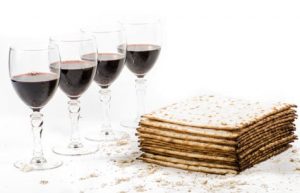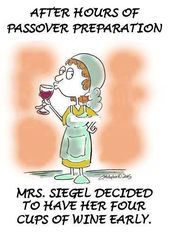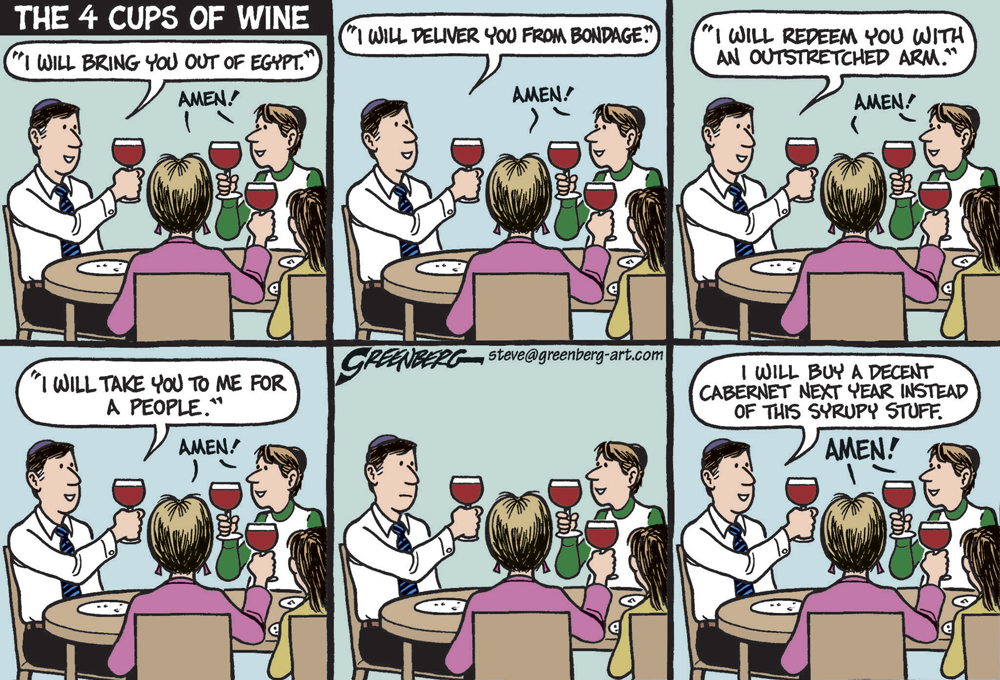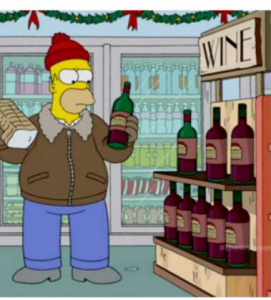
The fact that we are a week away from Pesach and Seder Night seems unbelievable. We are going through truly unbelievable times, with everyone I know experiencing stress, fear and often the unimaginable horror of watching someone you know or love succumb to the virus ravaging the world. So much seems to have happened in such a short few weeks, with more seemingly to come. My heart goes out to each of you and hope you, your families and loved ones are all doing as well as can be during these challenging times. I am in no position to offer any understanding of what hashem wants form us, but do believe we should take the opportunity to remember that there is far more that unifies us than divides us, both as Jews and humans. During these troubled times I am seeing tremendous acts of chesed being done everywhere as people embrace the concept of “kol yisral aravim ze la ze”. At all times but especially during these unprecedented times of trouble, we owe it to each other to treat others with extra measures of calm, kindness compassion and love, and to try and find ways to ease the burdens of those less fortunate than us – of which unfortunately, there are many.
Choosing wines for your seder may be the furthest thing from your minds with all that is going on, however we are taught by our sages that wine gladdens the heart and there is no joy without wine (and meat). And while joy may be unfathomable to many these days, Pesach is a celebration of the Jewish people coming together a nation for the first time, definitely an idea we can, should and are getting behind with everything we have got. With wine such an integral part of the Pesach holiday, physical and spiritual aspects combined, my hope is that this annual guide makes the task easier and hopefully helps in enhancing the strangely unique seder we are each about to undergo, regardless of our personal circumstances. Whether you are spending it alone, with your spouse, sibling, nuclear family or are lucky enough to be able to safely enjoy the company of a few other people, the smaller nature of this year’s celebrations is an opportunity to slow things down, contemplate the nature of the holiday while enjoying the quiet break from the noise and commotion raging outside our windows.
Busy Times
Typically, the weeks leading up to Pesach are the US kosher wine industry’s busiest, with more kosher wine purchased during this period than the rest of the year combined (in Israel, Rosh Hashanah is nearly as busy a buying season as Pesach and wine buying is also more liberally spread out through the year). While this year is as far from typical as any of us could have ever imagined, wine and Pesach were still destined to be together by Hashem and buying wine for Pesach remains one of the best parts of Pesach prep for every committed wine lover. However, even though the more than 4,500 different kosher wines being produced annually includes almost 100 disparate varieties of “Fake Wines” like Kedem Malaga, Manischewitz, variations of Yayin Patishim and of course the Blue Bottle Abomination, there remain far too many labels for any sane human being to wade through.
Elevated Stress Levels
 Every year we talk about the elevated stress levels brought on by cooking commercial grade levels of brisket and matzah balls while attempting to eradicate every speck of dirt from the inside of your oven with a toothbrush and how wine selection shouldn’t be an added source of stress. While each and every one of us is already dealing with unimaginable stress levels brought on by the pandemic, I feel more strongly than ever before that wine selection should be as easy, simple and enjoyable as possible. However, as this guide is used by most readers throughout the year as a benchmark for which wines to acquire and all the potential pitfalls remain (and then some), we are going to remain focused on the usual matters the guide is mean to help alleviate while also discussing some of this year’s unfortunately special attributes.
Every year we talk about the elevated stress levels brought on by cooking commercial grade levels of brisket and matzah balls while attempting to eradicate every speck of dirt from the inside of your oven with a toothbrush and how wine selection shouldn’t be an added source of stress. While each and every one of us is already dealing with unimaginable stress levels brought on by the pandemic, I feel more strongly than ever before that wine selection should be as easy, simple and enjoyable as possible. However, as this guide is used by most readers throughout the year as a benchmark for which wines to acquire and all the potential pitfalls remain (and then some), we are going to remain focused on the usual matters the guide is mean to help alleviate while also discussing some of this year’s unfortunately special attributes.
With wine such an integral part of the Pesach experience, the massive amount of choices can create a particularly stressful shopping experience as one contemplates the near-endless number of choices on the shelves or webpage of your favorite retailer. Exacerbating the issue are several mitigating circumstances including the sheer number of mediocre-at-best available wines (along with an acceptable amount of true drek) and the unfortunate tendency of many retailers to part you from your hard earned shekels by selling these less than worthy wines. Typically stemming from a lack of knowledge, occasionally more sinister reasons are at play so, like in any other transaction, caveat emptor. Other aggravating obstacles include lack of vintage transparency and the oenophilic “bait and switch” – advertising great deals for allocated wines without having them in stock and then selling you copious amounts of sub-par wines. Adding to the fun is the terrible fact that many stores and online purveyors continue to sell wines that are so far past their optimum drinking windows that it’s practically criminal.
Help is Here
 In attempt to reduce stress levels in any way I can, I have done the work for you and curated my Annual Pesach Kosher Wine Buying Guide from among the multitude of options being made available. Hopefully the Guide will simplify your wine shopping and allow you to get back more important holiday preparations like being there for your family with love and compassion, helping the many people in dire need of social, emotional and financial support to enjoy a Pesach holiday as it first came to be – as a nation coming together for the first time while developing a more-important-than ever before relationship with hashem (this in addition to the normal stress of preparing Pesach, including those making such preparations for the first time and those contemplating a holiday spent with the fewest number of people ever).
In attempt to reduce stress levels in any way I can, I have done the work for you and curated my Annual Pesach Kosher Wine Buying Guide from among the multitude of options being made available. Hopefully the Guide will simplify your wine shopping and allow you to get back more important holiday preparations like being there for your family with love and compassion, helping the many people in dire need of social, emotional and financial support to enjoy a Pesach holiday as it first came to be – as a nation coming together for the first time while developing a more-important-than ever before relationship with hashem (this in addition to the normal stress of preparing Pesach, including those making such preparations for the first time and those contemplating a holiday spent with the fewest number of people ever).
The Guide covers my top recommendations for wines in the following five price tiers: (1) Under $18, (2) between $18-29.99, (3) between $30-49.99, (4) Over $50 and (5) Moshiach Wines. As most of my readers know, Moshiach Wines are wines that I would proudly serve the Moshiach, were I ever sufficiently deserving for him to grace my Seder table.
Many of the wines on this list will not come as a surprise to my regular readers given their perennial appearance over the years resulting from the consistent excellence of their producers and the talent of the applicable winemaker. As years go by and the quality and quantity of top-notch kosher wines grows, the potential wines for this list gets longer, increasing the difficulty in providing this highly-curated list (listing every good wine would defeat the entire purpose of the list). Representing less than 5% of all commercially available kosher wines, the list should go a long way in easing the pain of sifting through all your options. For those desiring further curating, next week’s edition will also include a few of my personal favorites from each of the five price ranges. With the quality of white wines increasing year over year there are more white wines on the list than in prior years, especially on in the lower price ranges. If you are one of those unfortunate and self-proclaimed “I don’t drink white wine” people, please take this as an opportunity to try something new – I promise you won’t be disappointed.
The Fine Print
 As a transactional lawyer with nearly 20 years of deal-making under my belt, it shouldn’t surprise anyone that a list of this magnitude comes with some fine print and a few important caveats.
As a transactional lawyer with nearly 20 years of deal-making under my belt, it shouldn’t surprise anyone that a list of this magnitude comes with some fine print and a few important caveats.
1. The Guide isn’t intended to be a comprehensive list of every wine I believe worthy of your consideration. It represents a selection of the better wines available across different pricing tiers; each of which I recommend and believe worthy of your Pesach table. As you all know, I only write about wines I like and you can therefore safely purchase any wines previously recommended, even if they aren’t on this list, including last year’s guide (as I tried not to repeat wines). Of course, all wines remain subject to their recommended drinking window.
2. Broadly speaking, the majority of wines from Dalton, ElviWines, Flam, Gvaot, Recanati, Tzora and Yaacov Orayh are worth buying, even if they aren’t listed below. Additionally, many of last year’s wines are still available on the shelves and remain in top drinking condition so check out last year’s list for additional suggestions and/or vintages.
3. Some wines may only be available either in Israel or the US and are marked as such. While there remain a number of wines that remain available only in their country of production (e.g. Four Gates, Hajdu and Shirah in the US, Mia Luce in Israel and a number of French options in Europe), the vast majority of recommendable Israeli wines are imported to the US these days (Shmita excepting) and most of the Herzog/Royal wines that were formerly “US Only” wines, are exported to Israel, making this list more useful across the broadly disparate geographic location of my 11,000 subscribers.
4. Due to the disparate geographical disbursement of my reader base, the listed vintages may be different depending on which part of the world your shopping cart is located in (although vintages tend to also shift from local retailer to retailer and distributor to distributor, depending on how much of the prior vintage they have left in stock). Especially for Israeli wines, different vintages are available in Israel and outside of Israel.
5. It is always best practice to consult me before buying a recommended wine from a different vintage but in this case, given the fluctuation in quality of recent vintages and potential shipping/storage issues, I’d be even more careful than usual when utilizing this list to purchase non-listed vintages.
6. Prices fluctuate wildly from location to location, so when determining the price tier for each wine I typically average among a number of US online and brick and mortar options to achieve what is hopefully an average price for the various wines. However, listed wines in your local market may not always fall exactly within the listed price points (online price-checking is always a good idea, as is asking retailers to match listed prices).
7. To ensure the practical functionality of this list, I have not included wines only available to wine club members (e.g. Hajdu’s Guild, Herzog Tasting Room or Hagafen’s prix) and have significantly reduced the number of listed wines that aren’t generally available (Mia Luce from the 2016 vintage onwards) or have sold out (e.g. Four Gates wines or the lovely Condrieu from Le Vins de Vienne).
Seder Drinking Conundrum
 Despite occupying a top spot on any oenophile’s list of favorite customs, the tradition to consume four full cups of wine at the Seder brings a host of potential issues, whose solutions can require a bit of advance thought and planning.
Despite occupying a top spot on any oenophile’s list of favorite customs, the tradition to consume four full cups of wine at the Seder brings a host of potential issues, whose solutions can require a bit of advance thought and planning.
First and foremost is that four cups of is a lot of wine to consume at one sitting (especially for those who will be experiencing shorter than usual sedarim this year), especially given the fact that the first two cups are typically imbibed on an empty stomach. Another issue stems from the tradition of using a silver goblet for Kiddush (and the rest of the cups). While the easy solution of pouring the wine into a proper wine glass immediately following the recital of Kiddush works beautifully on a regular Shabbat or holiday, the lengthy Hagada ensures far more contact with the silver during the Seder. Other issues are caused by the common traditions of using only red wine and avoiding mevushal wines during the Seder.
With the Seder representing one of the most important meals on the Jewish calendar, people try to have the nicest (and typically the most expensive) wines possible, creating yet another potential conundrum. Despite being among the kosher wine world’s best, the top tier Bordeaux, Israel and California wines are not going to be properly appreciated giving the hurried manner in which most of the Seder’s four cups are mandated to be consumed. Many of the better wines are full-bodied, oak aged and boldly flavored; attributes not very conducive to Seder drinking. Between the empty stomach with which most people approach the first two cups, the halachic requirement to consume nearly an entire cup of wine rather rapidly and the added stress your under which your seder participants are likely to be operating this year; most sedarim are unlikely to offer ideal conditions for enjoying such magnificent wines. That said, with current circumstances causing unprecedented change to our lives, including religious customs, if your current circumstances allow for a leisurely seder enhanced by the finest wines in your cellar (including if you are spending seder physically alone this year) – go for it. The spiritual aspects of wine sanctifying our table and experience would make using your best bottles to elevate the exalted experience the seder is meant to be as good a use of it as one could imagine.
The Perfect Solution
 Otherwise, I suggest saving the more expensive wines for leisurely drinking during Shulchan Aruch and the plethora of subsequent holiday meals, while finding other worthy options for the four cups. Being a traditionalist, my personal custom is sticking with red wines for all four cups, while using a few basic principles to choose the proper wines. Many folks like to use Rose as a good compromise and, while most versions haven’t yet hit the market (and no 2018 or earlier options should be used), there are a few acceptable options, some of which have been included in the guide.
Otherwise, I suggest saving the more expensive wines for leisurely drinking during Shulchan Aruch and the plethora of subsequent holiday meals, while finding other worthy options for the four cups. Being a traditionalist, my personal custom is sticking with red wines for all four cups, while using a few basic principles to choose the proper wines. Many folks like to use Rose as a good compromise and, while most versions haven’t yet hit the market (and no 2018 or earlier options should be used), there are a few acceptable options, some of which have been included in the guide.
Despite the less than adequate conditions mandated by our traditions and extra important given the circumstances we all find ourselves in, Seder night is one of the most exalted evenings we get to spend in G-d’s company, while celebrating our freedom from oppressive slavery and the coalescing of the Jewish People into a nation with collective responsibility for one another. As such top quality wine is still a pre-requisite. Unlike most years where the large family gathering mandated a wide selection giving the likely disparate range of palate preferences, spending time with your nuclear family only allows one to be slightly more particular while choosing the wine. However, regardless of the number of participants (and even if you are on your own), you are going to want a range of wines. Therefore, I focus on affordable medium bodied quality wines that are highly approachable and enjoyable even without any oenophilic sophistication. Over the years, my “go-to” Seder wines have included Israeli Petite Sirah from Dalton and Recanati, entry-level Spanish wines from Capcanes and ElviWines and some of the well-priced newer options from Bordeaux in addition to the welcome addition of multiple lovely Pinot Noir wines from around the world. To the extent you are looking for well-priced and versatile white (or Rosé); good bets will be Rosé from Cantina Giuliano, Dalton or Hajdu; Sauvignon Blanc from Yarden, Covenant and Goose Bay, Pinot Grigio from Dalton or Yarden and Rieslings from Carmel or Kishor
Parting Advice
During this busy buying season, retailers pull out all the stops to bring in your dollars with big sales everywhere. Between the increasing competition and online availability of most top-notch kosher wines, most wine merchants will match any published price, so always ask your favorite retailer to match the prices you have seen elsewhere and, if you aren’t happy with the price – ask for a discount.
With all the explanations behind us, I present my:
Annual Pesach Kosher Wine Buying Guide
Under $17.99
 While a number of wines from this tier have moved up one level due to increased prices, t his range includes many good, enjoyable wines. With few exceptions, these wines aren’t complex or cellar worthy. With oak barrels representing a significant percentage of a wine’s cost (actual cost and the time-value of aging), many of these wines have spent little to no time in oak (although oak chips can provide certain benefits without the heavy costs) contributing to their lower prices. Along with focusing on “Safe Bet” wineries, varieties less popular than Cabernet Sauvignon, Merlot, Syrah and Chardonnay tend to be cheaper given their relative lack of familiarity. As such, Petite Sirah, Carignan, Cabernet Franc, Petit Verdot, Grenache, Roussanne and Gewürztraminer will usually provide better bang for your buck and are good places to look for bargains..
While a number of wines from this tier have moved up one level due to increased prices, t his range includes many good, enjoyable wines. With few exceptions, these wines aren’t complex or cellar worthy. With oak barrels representing a significant percentage of a wine’s cost (actual cost and the time-value of aging), many of these wines have spent little to no time in oak (although oak chips can provide certain benefits without the heavy costs) contributing to their lower prices. Along with focusing on “Safe Bet” wineries, varieties less popular than Cabernet Sauvignon, Merlot, Syrah and Chardonnay tend to be cheaper given their relative lack of familiarity. As such, Petite Sirah, Carignan, Cabernet Franc, Petit Verdot, Grenache, Roussanne and Gewürztraminer will usually provide better bang for your buck and are good places to look for bargains..
Most of the wines on these lists qualify as YH Best Buys (wines especially worthy of your hard-earned cash).
- Cantina Giuliana, Rose, 2019
- Chateau Bellerives, Bordeaux, 2018
- Chateau Genlaire Bordeaux 2018
- Chateau les Riganes, White, Bordeaux, 2018 (also the 2018 Red)
- Dalton, Estate, Pinot Gris, 2018 (also Estate Chenin Blanc 2018)
- Dalton, Rose, 2019 (also the Reserve Sauvignon Blanc)
- ElviWines, Rioja, 2018 (Blue and White label) [mevushal]
- ElviWines, Vina Incina, White, 2018 (also the 2019) [mevushal]
- Golan Heights Winery, Gilgal (Gamla in Israel), Brut, n.v.
- Golan Heights Winery, Yarden, Sauvignon Blanc, 2019 (also 2018 Pinot Gris)
- Gush Eztion, Lone Oak, Sauvignon Blanc, 2019
- Herzog, Baron Herzog, Chardonnay, 2019 [both mevushal]
- Koenig, Riesling, Alsace, 2017 [US / mevushal]
- Netofa, Domaine Netofa, Red, 2018 (also the 2018 White)
- O’dwyers Creek, Sauvignon Blanc, 2018 [mevushal]
- Or HaGanuz, Amuka, Blanc, 2019 [mevushal]
- Pacifica, Riesling, 2018
- Recanati, Upper Galilee, Sauvignon Blanc, 2018
- Recanati, Mediterranean Blend, White, 2018 [Israel]
- Segal, Fusion, Red, 2017 [mevushal]
- Tabor, Adama, Rosé, 2019 (also the Sauvignon Blanc 2018)
- Tabor, Mount Tabor, Cabernet Sauvignon, 2017 [mevushal]
- Terra di Seta, Chianti Classico, DOCG, 2016 (or the 2017 or 2018)
- Vitkin, Israel Journey, White, 2018
$18-29.99
As the average price of a quality bottle of kosher wine continues to surge, it’s refreshing to find a number of wineries valiantly trying to hold their ground at affordable. While most great wines remain over $30, there are plenty of great ones here. In general, I find Carmel, Dalton, ElviWines, the Golan Heights Winery, Recanati and the wines under Herzog’s Special Reserve label to be consistent players in price range (although 2017 wasn’t as kind as 2016 or 2014, while having terrific more expensive wines as well).
- Adir, Kerem Ben-Zimra, Sauvignon Blanc, 2018
- Barkan, Beta, Marawi, 2017 [Israel]
- Barons Edmond & Benjamin de Rothschild, Haut Medoc, 30th Anniversary, 2016 [mevushal]
- Chateau de Cor Bugeaud, Bordeaux, 2018 [mevushal]
- Covenant, Blue C, Viognier, 2018
- Covenant, Red C, Sauvignon Blanc, 2019
- Dalton, Reserve, Viognier, 2018 (also the 2017 Alma Scarlet)
- Domaine du Castel, La Vie, Rouge, 2017
- Evyatar, Petit Verdot, 2014 [Israel]
- Five Stones, D v G, White (Chenin Blanc-Roussanne), 2018 (also the 2016 Red)
- Flam, Blanc, 2018 (also the 2017 Classico)
- Flechas De Los Andes, Malbec, 2017
- Galil Mountain, Yiron, 2016
- Golan Heights Winery, Yarden, Blanc de Blanc, 2011 (or 2012)
- Goose Bay, Pinot Grigio, 2018 (also 2018 Chardonnay) [both mevushal]
- Gush Etzion, Blessed Valley, Chardonnay, 2018
- Gvaot, Dances in White, 2018
- Hagafen, Dry Riesling, 2018 [mevushal]
- Herzog, Special Reserve, Cabernet Sauvignon, Alexander Valley, 2016 (also 2016 Russian River Chardonnay) [both mevushal]
- Jerusalem Winery, 4990, Cabernet Sauvignon, Eish Kodesh, 2016 (also 4990 Montifiore Chardonnay))
- Jezreel Valley, Nahalal, 2018
- Jezreel, Viognier, 2018 (also the 2018 Gewurztraminer)
- Kishor, Kerem Kishor, Viognier, 2018
- Les Marronniers Chablis 2018 [US / mevushal]
- Louis Blanc, Beaujolais, 2015 (also the 2014 Cotes du Rhone Villages, Servigny, 2014)
- Lueria, Terrace, 2016
- Matar, Sauvignon Blanc-Semillon, 2017 (also the 2017 Chenin blanc)
- Porto Quevedo, Ruby Port, n.v. [US]
- Psagot, Rosé, 2019
- Ramon Cardova, Albarino, Rias Baixas, 2018
- Recanati, Ancient Vines, Bittuni, 2018 (also the 2018 Marawi)
- Teperberg, Inspire, Meritage, 2018 (also the Farmitage White) [mevushal]
- Twin Suns, Reserve, Malbec, 2016
- Tzora, Judean Hills, Red, 2017 or 2018
- Tzora, Judean Hills, White, 2018
- Vitkin, Pinot Noir, 2018 (also the Red Israel Journey)
- Vitkin, Collector’s Edition, Riesling, 2018 [Israel] (also the Gewurztraminer)
- Vitkin, Collector’s Edition, Grenache Noir, 2018
- Yair, Mount Amsa, White, 2018
$30-49.99
While a lot of good options sit in this category, many of them really should be priced in the lower range but have crept up in price for no justifiable reason. It’s harder to sell wines in this price range than the one above or below it. It’s nearly impossible to find a YH Best Buy on this list. As with most higher-end wines, especially those with a year or more of barrel aging, these need time to open up (often the current vintage should be regulated to a few years of aging since it simply isn’t ready for primetime). In any event, do yourself a favor and get a decanter to ensure that you are obtaining maximum benefit from these wines in the event that you don’t or cannot cellar them before enjoying.
- Bergevin Lane Vineyards, Cabernet Sauvignon, Walla Walla, 2018 [US]
- Champagne Drappier, Saignee, Rose, Brut, n.v.
- Chateau Bellegrave, Saint-Emilion, 2016
- Château Fourcas Dupree, 2017
- Château Gazin-Rocquencourt, White, 2018
- Chateau Guimberteau, Lalande-De-Pomerol, 2016 [US / Europe]
- Château Marquisat de Binet, Cuvee Abel, Montagne St. Émilion, 2014 [US]
- Château Royaumont, Lalande de Pomerol, 2017
- Château Tour Seran, Medoc, 2014
- Covenant, Red C, Rose, Rose (also the 2017 Lavan Chardonnay)
- Dalton, Anna, n.v. (also the Dalton Zivan Cabernet Sauvignon)
- Domaine du Castel, “C”, Chardonnay, 2017 (also the 2018 Petite Castel)
- Domaine Netofa, Latour Netofa, White, 2018
- Domaine Netofa, Tel Qasser, White, 2018
- Flam, Camellia, Chardonnay, 2018 [Israel]
- Golan Heights Winery, Yarden, Brut, Rosé, 2013
- Gush Etzion, Reserve, Lone Oak, Cabernet Sauvignon, 2017
- Gvaot, Gofna Reserve, Chardonnay-Cabernet Sauvignon, 2017
- Gvaot, Gofna Reserve, Merlot, 2017
- Hajdu, Hajdu, Rosé, 2019 [US]
- Hayotzer, Virtuoso, Chardonnay, 2017
- Jacques Capsouto, Cuvee Marco, Grand Vin, 2016
- Jean-Pierre Bailly, Pouilly-Fumé, 2018 [US]
- Les Roches de Yon-Figeac, Saint-Émilion, 2016
- Matar, Cumulus, 2016 (also the 2016 Stratus)
- Recanati, Mediterranean Reserve, Syrah 2017
- Recanati, Special Reserve, White, 2017
- Shiloh, Secret Reserve, Petit Verdot, 2017
- Shirah, Bro.Deux, 2017 (also the 2016 Geshem) [both US]
- Shirah, Gruner Veltliner, Fiddlestix, 2018 (the “regular” 2018 Gruner is also lovely) [US]
- Teperberg, Essence, Malbec, 2016
- Terra di Seta, Assai, Chianti Classico, Gran Selezione, DOCG, 2013 (also the 2016 Riserva)
- Tura, Mountain Heights, Merlot, 2016
- Tzora, Shoresh, Red, 2018 (also the 2018 Shoresh White)
- Ya’acov Oryah, Silent Hunter, White Blend, 2018 (also the 2018 Light from Darkness)
- Ya’acov Oryah, Soulmate, 2018 (up there for best wine name ever)
Over $50
Over the decade of producing the Guide, many deserving wines were repeatedly excluded because they were priced over $50 and didn’t quite make the exalted “Moshiach Wine” club. Whether any particular wine is “worth it” is a subjective matter with a newsletter all to itself, these are great wines that will bring great pleasure while properly honoring your Pesach experience. Even more than the prior tier, proper aeration and cellaring will have a huge impact of extracting maximum pleasure from these wines.
- Carmel, Limited Edition, 2017
- Champagne Barons de Rothschild, Brut, n.v.
- Château, Clos des Lunes, Lune d’Argent, Bordeaux Blanc, 2018
- Château du Tertre, Marguax, 2016
- Château Gazin-Rocquencourt, Red, 2017
- Château Le Crock, Saint-Estèphe, 2017
- Château Moulin Riche, Saint Julien, 2017
- Covenant, Cabernet Sauvignon, 2017 (also the Red C Cabernet Sauvignon 2018)
- Dalton, Matatia, 2014
- Domaine du Castel, Grand Vin, 2016 (2010) [Israel]
- Domaine Netofa, Late Bottled (LBV) Port, 2012 [Israel]
- Famiglia Cotarella, Montiano, 2014
- Feldstein, White Blend, 2017
- Flam, Reserve, Cabernet Sauvignon, 2017
- Hajdu, Proprietary Red, 2016 (also the 2018 Grenache) [US]
- Herzog, Single Vineyard, Cabernet Sauvignon, Calistoga, 2016 (also the 2017 Clone Six)
- Herzog, Special Edition, Cabernet Sauvignon, Lake Count, 2017
- Jean-Luc & Paul Aegerter, Bourgogne, Hautes Cotes de Nuits, 2018 [US]
- Marciano, Terra Gratia, 2017 [US] (also the 2016)
- Matar, CB, 2016
- Shirah, Carignan, Whalerock, 2016
- Tabor, Malkiya, Cabernet Sauvignon, 2016
- Teperberg, Legacy, Cabernet Franc, 2017
- Tura, Mountain Peak, 2016
- Yatir, Forest, 2016
Moshiach Wines (for more Moshiach Wines, check out my Best Wines of 2018)
 Moshiach wines are the really special wines that represent top-notch winemaking and plenty of patience on the consumer’s part to allow the wines the additional aging time in the bottle before the wine showcases all it can be (and the perfection intended by the winemaker). Unfortunately as our world continues to devolve into the pursuit for instant gratification, the terrible crime of consuming high-end wines shortly after they are purchased is a crying shame. While certain top tier wines are structured for immediate consumption and long-term aging, a few years of aging nearly always does good things for these wines and is worth the extra time, effort and patience. With the continued global expansion of my Rosh Chodesh Club concept (over 30 regular monthly meetings worldwide), more and more folks and getting to experience the immense pleasure derived from properly aged mature wines and with the recognition that a few years of storage can yield a stratospheric ROI, many more wines are finding their way to the cellar instead of the table upon purchase – which is a great thing!
Moshiach wines are the really special wines that represent top-notch winemaking and plenty of patience on the consumer’s part to allow the wines the additional aging time in the bottle before the wine showcases all it can be (and the perfection intended by the winemaker). Unfortunately as our world continues to devolve into the pursuit for instant gratification, the terrible crime of consuming high-end wines shortly after they are purchased is a crying shame. While certain top tier wines are structured for immediate consumption and long-term aging, a few years of aging nearly always does good things for these wines and is worth the extra time, effort and patience. With the continued global expansion of my Rosh Chodesh Club concept (over 30 regular monthly meetings worldwide), more and more folks and getting to experience the immense pleasure derived from properly aged mature wines and with the recognition that a few years of storage can yield a stratospheric ROI, many more wines are finding their way to the cellar instead of the table upon purchase – which is a great thing!
Please note that some of the Moshiach wines are very limited edition wines that may not be easily available at your local retailer. While they may be a tad difficult to lay your hands on, I promise they are all worth the extra effort and additional expense. Additionally and as is the case with many of the best wines, many become Moshiach wines only after a few years of aging. As older vintages (that have been stored properly) are somewhat difficult to come by, the list includes the current vintage for many of the wines and, for a number of the wines I have included (at least one of) the vintages that makes the wine fit for the Moshiach (buy the current vintages, store them properly for a few years and voila – house-made Moshiach wines).
- Capcanes, Peraj Ha’Abib, 2008 or 2009
- Château Giscours, Margaux, 2017 (2003)
- Château Lafon Rochet, Saint-Estèphe, 2017 (2003, 2010)
- Château Lascombes, Margaux, 2016
- Château Léoville Poyferré, Saint Julien, 2017 (2000, 2005)
- Chateau Malartic Lagraviere, Pessac-Léognan, 2016 (2005)
- Château Pontet-Canet, Pauillac, 2003
- Château Rayne Vigneau, Sauternes, 2014
- Château Smith Haut Lafitte, Pessac-Léognan, 2014 (2000, 2009)
- Domaine Roses Camille, Pomerol, 2012 (2006) [US]
- ElviWines, Clos Mesorah, 2016 (2010)
- Flam, Noble, 2016 (2011)
- Four Gates, Chardonnay, 2018 (2007, 2011) [US]
- Golan Heights Winery, Yarden, Katzrin, 2014 (2008 [shmita])
- Gvaot, Masada, 2016 (2012)
- Marciano, Marciano Estate, Cabernet Sauvignon, 2017 [US]
- Tzora, Misty Hills, 2017 (2011)
- Vitkin, Shorashim, Red, 2016 (also the Shorashim LH Gewurztraminer 2018 [both Israel]
- Yaacov Oryah, Old Musketeer, Sweet White Wine, 2008 [Israel / shmita]